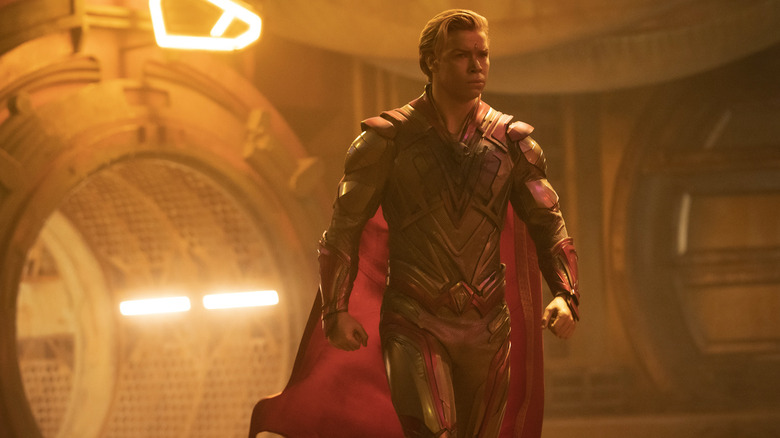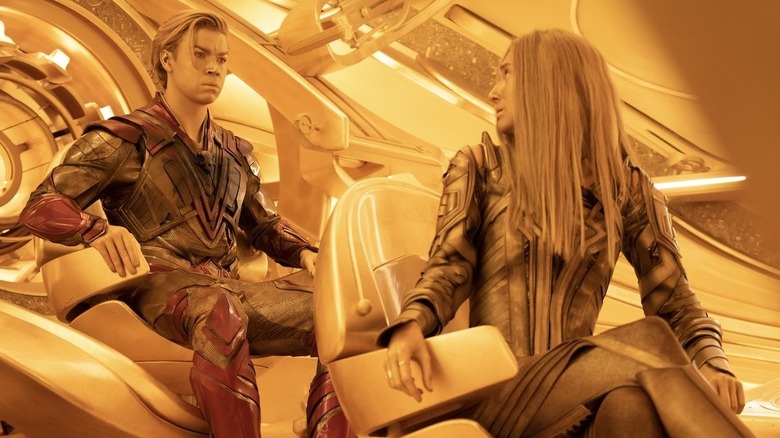James Gunn Struggled With Writing Adam Warlock Into Guardians Of The Galaxy 3
"Guardians of the Galaxy Vol. 3" is a worthy conclusion to James Gunn's trilogy and his work at Marvel Studios. An outlier in the Marvel Cinematic Universe, it's a movie with soul and purpose beyond just moving the entire universe forward to the next thing, and it features character arcs that go somewhere and a rare thing for this franchise: an actual ending. (Granted, the animal abuse is a bit much, but Rocket's friends are incredible and adorable characters.)
The movie also pays off the post-credits scenes from its predecessor by bringing Sylvester Stallone and his original Guardians team back and finally introducing Adam Warlock, one of the coolest Marvel characters from the comics.
As cool as Adam is, and as funny as actor Will Poulter is in the role, he doesn't really fit the movie, and sticks out like a sore thumb every time he shows up. Speaking with io9, writer/director James Gunn himself admits he struggled particularly hard to bring Adam Warlock in. "There's no doubt it was Adam Warlock [that was hardest to organically bring to the story]," Gunn said, revealing that he actually wrote Adam to be a bigger part of the second film:
"A lot of the stuff was written for Volume 2. Originally, Adam Warlock was in Volume 2 and he was sort of the opposing force that — I seem to always have a second force, right? So there's, like, in the first movie, Yondu serves that position. He's an alternate force. And in the second movie, Ayesha serves that position. And in this movie, it's Adam and Ayesha together. So, I always had him in, you know, the character in mind from that movie and then he seemed to fit better in this movie than he did in that movie."
The MCU problem
Sure, Adam Warlock ties into what's going on with the High Evolutionary, but he doesn't really fit in with the rest of the movie, and every time he shows up, it stops the momentum. The thing is, Warlock is just a small part of a larger problem with Marvel, a sign of the world's biggest franchise perhaps being too big for its own good.
The secrecy of these movies and their interconnectivity is ultimately causing more head-scratching workarounds than cool stories. Take "Thor: Love and Thunder," a movie that had to reconcile Taika Waititi's vision for the story with where the characters ended up in "Avengers: Endgame" — meaning Thor joining the Guardians. The solution was to simply ignore the "Endgame" stuff after the opening scene. Even "Guardians 3" was affected by Gamora's death in "Infinity War," which feels as if it clashes with Gunn's original plan for the character. Likewise, the Spider-Man movies have all but ignored that meeting between Vulture and Scorpion in "Homecoming," while "Doctor Strange" teased the second movie would be about Mordo killing all sorcerers, but "Multiverse of Madness" literally just explained that conflict off-screen.
As Marvel gets bigger, as multiverses get introduced and characters go on big tie-in adventures in other movies, the idea of paying off established teases vs. serving the larger planned-out story becomes increasingly important. Should they just ignore cool teases like Adam Warlock, or Charlize Theron playing Clea, simply because they may clash with what the writer of the new movie wants to do? Or should they force sequels to shoehorn characters into the plot in order to lay groundwork for future appearances further down the line?
There is no one simple answer, but the way Marvel decides to strike that balance could have significant ripple effects throughout the MCU.

